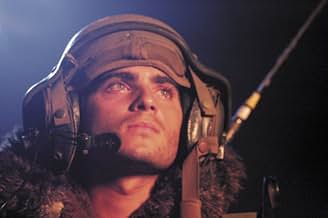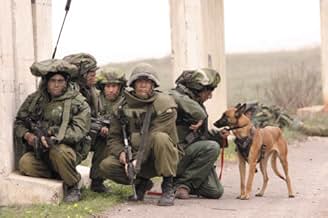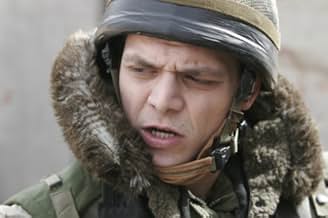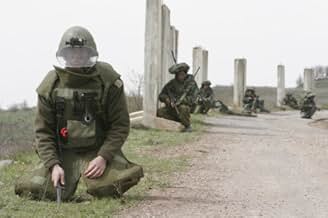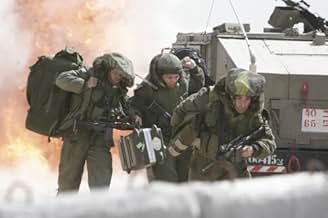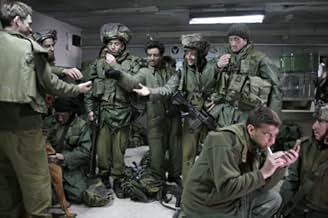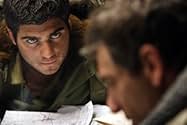The story of a group of Israeli soldiers stationed in an outpost prior to the withdrawal of forces of 2000.The story of a group of Israeli soldiers stationed in an outpost prior to the withdrawal of forces of 2000.The story of a group of Israeli soldiers stationed in an outpost prior to the withdrawal of forces of 2000.
- Nominated for 1 Oscar
- 5 wins & 9 nominations total
Arthur Perzev
- Yonatan Shpitzer
- (as Arthur Faradjev)
Zohar Strauss
- Rossman
- (as Zohar Shtrauss)
Ya'akov Ahimeir
- Self
- (as Yaakov Ahimeir)
- Director
- Writers
- All cast & crew
- Production, box office & more at IMDbPro
Featured reviews
Right-wing audiences have criticized "Beaufort" for being left-winged, while left-wing audiences have criticized the movie for being right-winged. Immediately that should tell you this is a movie worth watching.
Like all great war films, "Beaufort" avoids situational politics and instead focuses on the broader, universal issue of war which all sides can agree upon: war is hell. Or specifically in this case, war is pointless hell. Here we have an excellent illustration; "Beaufort" is the story of a handful of soldiers who fight admirably to defend a fort, simply so that they can abandon it as planned a few days later. Folks, it don't get any more pointless than that. I would tip my hat to the genius who came up with such a great metaphor, but the funny thing is that the story came straight out of history.
(Note: although this film depicts the Israeli withdrawal from Castle Beaufort which was returned to Lebanon in 2000, it was actually filmed at a different fortress at the Golan Heights in Syrian territory currently held by Israel.)
Joseph Cedar directs this film in a tense, claustrophobic way with narrow, labyrinthine corridors that burrow deep into the mountain. I was instantly reminded of the classic submarine film "Das Boot" and wasn't surprised one bit when I read that Cedar was highly influenced by that film. "Beaufort" shares several qualities with "Das Boot" such as the facelessness of the enemy (all we see are the incoming mortars & missiles), the youth & inexperience of the soldiers (Beaufort's commander is 22 and most of the soldiers are 18- 20 years old), and of course the constricting, suffocating feeling of being stuck in a steel tube while, outside, the powers that be are deciding your fate.
One notable difference between "Beaufort" and "Das Boot" are the infrequent but powerful shots of the gorgeous landscape, the humbling presence of the 12th century ruins, and other scenes of nature which lend a positive breath of fresh air to an otherwise dismal setting. This, I'm sure, was very deliberate on the part of the director, and at one point there's a nice speech where one soldier says to another, "This will all be a tourist attraction, and you can bring your girlfriend here and tell her this is where Outpost Green once was."
And that, to me, is what separates "Beaufort" from the standard "war is hell" stories. Regardless of how the story ends up, you get a feeling that eventually the majesty of nature will prevail--or should I say the stupidity of humans will fail. Same thing, I guess.
Peculiar highlights of this film include a powerful, sad song sung by one of the soldiers in the barracks, and one of the cutest war dogs ever. (And if, like me, you always cringe at animals being used in films that aren't regulated by the AHA or RSPCA, don't worry I don't believe there was any animal cruelty here.)
Other great (anti-)war films that focus on the psychology of the soldier rather than the action of battle include: the aforementioned "Das Boot" set entirely in a German submarine, "None But the Brave" about an American & a Japanese platoon each stranded on a remote island together, and an excellent war-drama-comedy from Korea called "Welcome to Dongmakgol" about N & S Korean enemies meeting in a remote village where none of the villagers are aware that a war is going on.
All of these great films can be viewed free of politics if you just ignore the uniforms. Both right-wingers & left wingers alike can find common ground with the universal thought (to quote ex-Marine talk radio host Kim Peterson), "the only point of war is to kill people and break things!"
Like all great war films, "Beaufort" avoids situational politics and instead focuses on the broader, universal issue of war which all sides can agree upon: war is hell. Or specifically in this case, war is pointless hell. Here we have an excellent illustration; "Beaufort" is the story of a handful of soldiers who fight admirably to defend a fort, simply so that they can abandon it as planned a few days later. Folks, it don't get any more pointless than that. I would tip my hat to the genius who came up with such a great metaphor, but the funny thing is that the story came straight out of history.
(Note: although this film depicts the Israeli withdrawal from Castle Beaufort which was returned to Lebanon in 2000, it was actually filmed at a different fortress at the Golan Heights in Syrian territory currently held by Israel.)
Joseph Cedar directs this film in a tense, claustrophobic way with narrow, labyrinthine corridors that burrow deep into the mountain. I was instantly reminded of the classic submarine film "Das Boot" and wasn't surprised one bit when I read that Cedar was highly influenced by that film. "Beaufort" shares several qualities with "Das Boot" such as the facelessness of the enemy (all we see are the incoming mortars & missiles), the youth & inexperience of the soldiers (Beaufort's commander is 22 and most of the soldiers are 18- 20 years old), and of course the constricting, suffocating feeling of being stuck in a steel tube while, outside, the powers that be are deciding your fate.
One notable difference between "Beaufort" and "Das Boot" are the infrequent but powerful shots of the gorgeous landscape, the humbling presence of the 12th century ruins, and other scenes of nature which lend a positive breath of fresh air to an otherwise dismal setting. This, I'm sure, was very deliberate on the part of the director, and at one point there's a nice speech where one soldier says to another, "This will all be a tourist attraction, and you can bring your girlfriend here and tell her this is where Outpost Green once was."
And that, to me, is what separates "Beaufort" from the standard "war is hell" stories. Regardless of how the story ends up, you get a feeling that eventually the majesty of nature will prevail--or should I say the stupidity of humans will fail. Same thing, I guess.
Peculiar highlights of this film include a powerful, sad song sung by one of the soldiers in the barracks, and one of the cutest war dogs ever. (And if, like me, you always cringe at animals being used in films that aren't regulated by the AHA or RSPCA, don't worry I don't believe there was any animal cruelty here.)
Other great (anti-)war films that focus on the psychology of the soldier rather than the action of battle include: the aforementioned "Das Boot" set entirely in a German submarine, "None But the Brave" about an American & a Japanese platoon each stranded on a remote island together, and an excellent war-drama-comedy from Korea called "Welcome to Dongmakgol" about N & S Korean enemies meeting in a remote village where none of the villagers are aware that a war is going on.
All of these great films can be viewed free of politics if you just ignore the uniforms. Both right-wingers & left wingers alike can find common ground with the universal thought (to quote ex-Marine talk radio host Kim Peterson), "the only point of war is to kill people and break things!"
This film has just been aired on the Copenhagen International Film Festival and of all the Israeli films available, this was the one I was - not - going to see, and yet I did.
It is still only a few days, since I saw it, but the images return and the sheer originality in terms of being a 'war movie' coupled with the usual Jewish genius of making a point: in short comment, dry humor, body language, tone of voice, well chosen repetition i.e. the monotonous, almost dead, tone over a loudspeaker from the lookouts stationed to warn against 'incoming, incoming' missiles, which after explosion were commented on by,'impact, impact'.
After the third or fourth of these 'scenes' I suddenly felt a wave of claustrophobia and fear, which these young Israeli soldiers must have felt being stuck on a mountain top, without a visual enemy, and only lookouts to rely on for their own lives and safety, 'incoming, incoming' - crash, bang -'impact, impact' - it was unnerving.
This film is a must for anyone - also those who like me, are not war buffs, because it is not about war. It is about a lot of things. Reality, how to handle anxiety, frustration, loss, grief, in a tight and stuck environment, with no relief in sight, (Israel itself?) It is about individuality in terms of different personalities, backgrounds, political opinions who have to make it work and who do in their own humorous, gentle, aggressive, accepting way. It is about men and a male attitude which I have not witnessed for over thirty years,(and sorely missed); the honesty and humanity of men, and it is about exile.
The one lifeline to the home country; a dirt road, has been blocked by a strange explosive device for about a month, and this is where the film starts, with the bomb squad arriving at the outpost, to identify and disarm the device, so that the outpost can receive supplies once again...and a whole 'different' story is touched upon.
I could go on for hours about this film, and not in a very logical way, since all the 'points' haven't been connected yet, it has so many layers. This what I call genius - 'layering' and this is what I look for in Israeli film and this year it was Beaufort, who delivered. Go and see it.
It is still only a few days, since I saw it, but the images return and the sheer originality in terms of being a 'war movie' coupled with the usual Jewish genius of making a point: in short comment, dry humor, body language, tone of voice, well chosen repetition i.e. the monotonous, almost dead, tone over a loudspeaker from the lookouts stationed to warn against 'incoming, incoming' missiles, which after explosion were commented on by,'impact, impact'.
After the third or fourth of these 'scenes' I suddenly felt a wave of claustrophobia and fear, which these young Israeli soldiers must have felt being stuck on a mountain top, without a visual enemy, and only lookouts to rely on for their own lives and safety, 'incoming, incoming' - crash, bang -'impact, impact' - it was unnerving.
This film is a must for anyone - also those who like me, are not war buffs, because it is not about war. It is about a lot of things. Reality, how to handle anxiety, frustration, loss, grief, in a tight and stuck environment, with no relief in sight, (Israel itself?) It is about individuality in terms of different personalities, backgrounds, political opinions who have to make it work and who do in their own humorous, gentle, aggressive, accepting way. It is about men and a male attitude which I have not witnessed for over thirty years,(and sorely missed); the honesty and humanity of men, and it is about exile.
The one lifeline to the home country; a dirt road, has been blocked by a strange explosive device for about a month, and this is where the film starts, with the bomb squad arriving at the outpost, to identify and disarm the device, so that the outpost can receive supplies once again...and a whole 'different' story is touched upon.
I could go on for hours about this film, and not in a very logical way, since all the 'points' haven't been connected yet, it has so many layers. This what I call genius - 'layering' and this is what I look for in Israeli film and this year it was Beaufort, who delivered. Go and see it.
10rob68
Beaufort is a remarkable war movie, with a cinematic style that really says something about the war and the situation in which the troops are in. the story is told through the eyes of the main character, Liraz, who's awareness of himself and the nature of the battle he's in gradually deepens into a sharp and original view on war and fear of death. the tension that is created throughout the film is a result not of fast paced action events, but through a series of scenes that takes the viewer into the world of this outpost, with all its claustrophobia, and mixed emotions that include the thrill of danger and numbness toward tragedy, but also simple fear that cannot be overcome. I recommend this movie to everyone.
Considering the sanitized pulp that the United States military participates in the filming of, it is refreshing to see a movie about soldiers that rings true and does not shy away from controversy. The IDF must also be commended for actively participating in the making of a film that does not shine the best light on the occupation of southern Lebanon.
Ultimately it is Israeli politicians and inept commanders that take the brunt of the blame for the appalling conditions the soldiers portrayed in this movie endure while holding on to their mountain top position.
Hezbollah obviously plays a part in this story, yet they are an unseen presence. They are always just out of the frame and sporadically, sometimes shockingly so, they remind everyone involved of their lethal potential.
Set aside your preconceived notions of the Israeli-Arab conflict and see this movie.
Ultimately it is Israeli politicians and inept commanders that take the brunt of the blame for the appalling conditions the soldiers portrayed in this movie endure while holding on to their mountain top position.
Hezbollah obviously plays a part in this story, yet they are an unseen presence. They are always just out of the frame and sporadically, sometimes shockingly so, they remind everyone involved of their lethal potential.
Set aside your preconceived notions of the Israeli-Arab conflict and see this movie.
10tongue-3
In 1982, Israel was forced to invade southern Lebanon in self defense after repeated attacks. But after holding a buffer zone for 18 years, with increasing casualties caused by a strengthening Hezbollah, the army's presence there began to seem pointless.
This is a story about soldiers stationed at an outpost in Lebanon just before the eventual withdrawal in 2000. It manages to raise many valid moral and existential questions without getting preachy or politically partisan. Beaufort is a strong film that really sticks in your mind afterwards. The dialogues spoken by the soldiers is very true to life and the movie is highly authentic in every respect. It is well directed, the cast is good across the board, and the visuals are persuasive and gripping. But most of all, Beaufort succeeds in giving you a real sense of the fear and suspense of being a sitting duck for Hezbollah rocket-launchers to fire at. It is utterly nerve-wrecking.
Minor flaws include the customary setting-up of a character's personality just before he gets killed, to make you mourn his loss more, but such obvious manipulations are few and don't significantly hurt the movie.
This is a story about soldiers stationed at an outpost in Lebanon just before the eventual withdrawal in 2000. It manages to raise many valid moral and existential questions without getting preachy or politically partisan. Beaufort is a strong film that really sticks in your mind afterwards. The dialogues spoken by the soldiers is very true to life and the movie is highly authentic in every respect. It is well directed, the cast is good across the board, and the visuals are persuasive and gripping. But most of all, Beaufort succeeds in giving you a real sense of the fear and suspense of being a sitting duck for Hezbollah rocket-launchers to fire at. It is utterly nerve-wrecking.
Minor flaws include the customary setting-up of a character's personality just before he gets killed, to make you mourn his loss more, but such obvious manipulations are few and don't significantly hurt the movie.
Did you know
- TriviaThe lead actor, Oshri Cohen (Liraz), did not serve on the IDF (Israeli Defence Force).
- ConnectionsFeatured in The 80th Annual Academy Awards (2008)
- How long is Beaufort?Powered by Alexa
Details
- Release date
- Country of origin
- Official sites
- Language
- Also known as
- Thị Trấn Beaufort
- Filming locations
- Production companies
- See more company credits at IMDbPro
Box office
- Budget
- $2,500,000 (estimated)
- Gross US & Canada
- $102,591
- Opening weekend US & Canada
- $6,808
- Jan 20, 2008
- Gross worldwide
- $271,340
- Runtime
- 2h 11m(131 min)
- Color
- Sound mix
- Aspect ratio
- 2.35 : 1
Contribute to this page
Suggest an edit or add missing content

